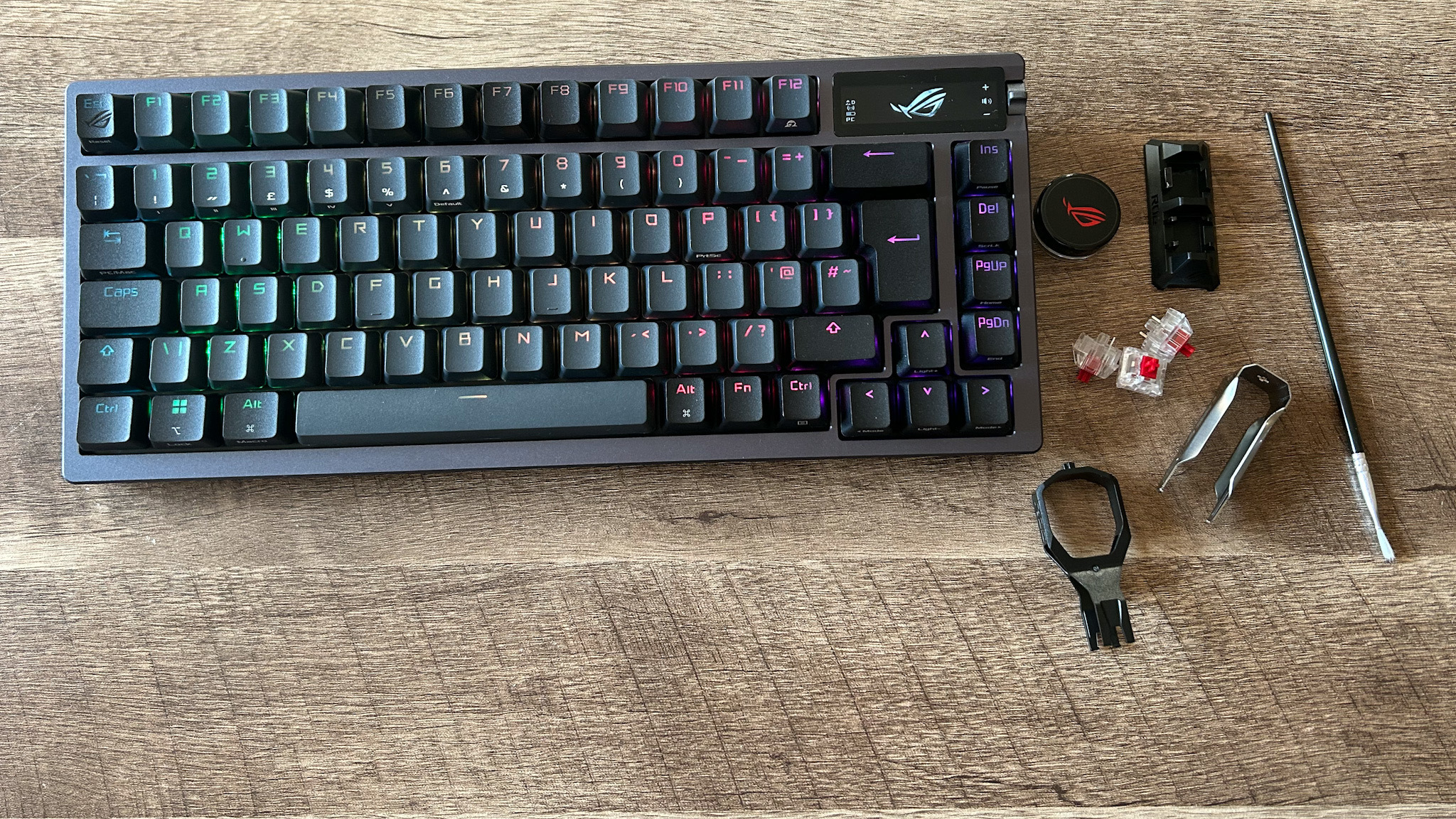GamesRadar+ Verdict
The Asus ROG Azoth is a revolution in hot-swappable gaming keyboards, setting the bar extremely high for 2023. Mixing the quality and design of an enthusiast-level custom keyboard with speedy gaming-focused features makes for the best typing experience I've ever had. It's pricey, but if you're looking to invest this is your top option right now.
Pros
- +
Outstanding typing experience
- +
Speedy and responsive
- +
Flexible OLED display and control knob
- +
Smaller design still offers plenty of functionality
Cons
- -
Will be difficult to swap keycaps
- -
One of the most expensive decks on the market
Why you can trust GamesRadar+
The Asus ROG Azoth is here, and the bar has officially been set high for 2023. The worlds of the pro typist and pro gamer have collided here, to create a supremely comfortable, endlessly customizable, solidly durable gaming keyboard. With a gasket-mounted design, hot-swappable functionality, and a real premium feel to each and every keystroke, this is a shoo-in for the best gaming keyboard of the year - and we're only in January.
I was blown away by the feel and performance of the Azoth during my two weeks of testing. From the thoughtful design to the rich feature list, all the way down to the feel of the keycaps and the support of stabilizers underneath them - this is a clear winner for anyone who can stomach its price tag. That's the only real clincher here - you're not going to get the feel and quality of a custom keyboard for mainstream prices. However, there are plenty of gaming keyboards knocking on this $249.99 / £269.99 price point - this is the first I'd truly be comfortable spending that kind of cash on.
| Type | Mechanical (hot-swappable) |
| Connection | Wired / Wireless |
| Size | 75% |
| Switches | ROG NX mechanical |
| Keycaps | PBT doubleshot |
| Media Keys | Dedicated volume clicker |
| Wrist rest | None |
| USB passthrough | None |
Design
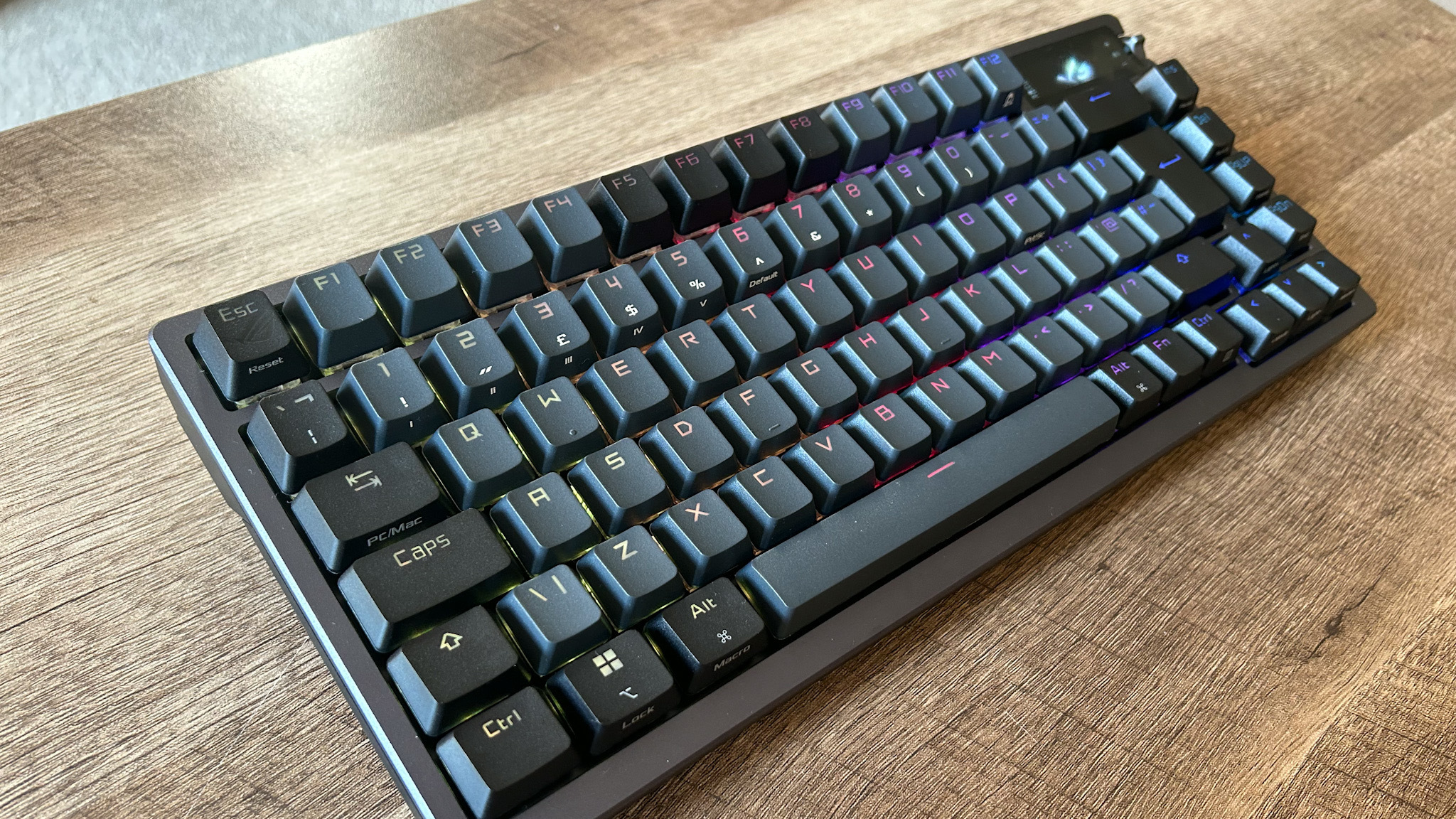
The Asus ROG Azoth is at once subtle in its gamer aesthetic while also screaming it loudly. It's a strange line to walk, but without the RGB flares and swirling logo on the OLED display, this could simply be another enthusiast keyboard sitting on your desk. The two-tone keycap array is in keeping with the aesthetic, alongside the slim-bezel, stocky form factor. Peer a little closer at the sides and you'll spot the sharp angular lines of many a gaming keyboard before it, though, and the legends that reveal themselves when those LEDs to spring to life will immediately reveal this deck's true intent.
Everything feels so incredibly soft yet satisfying here (and we're not even talking about the typing experience yet). The doubleshot PBT keycaps are slightly textured underhand to provide that all-important grip, but the slightly shorter height of each key keeps you moving swiftly across the deck all the same.
Of course, the gasket mount design certainly helps that overall experience. You'll find three layers of foam sandwiched between the top plate and the base, cushioning every press and dampening sound at the same time. The result is that soft, snappy feel, with no reverb even in stabilized keys like the space bar and enter.
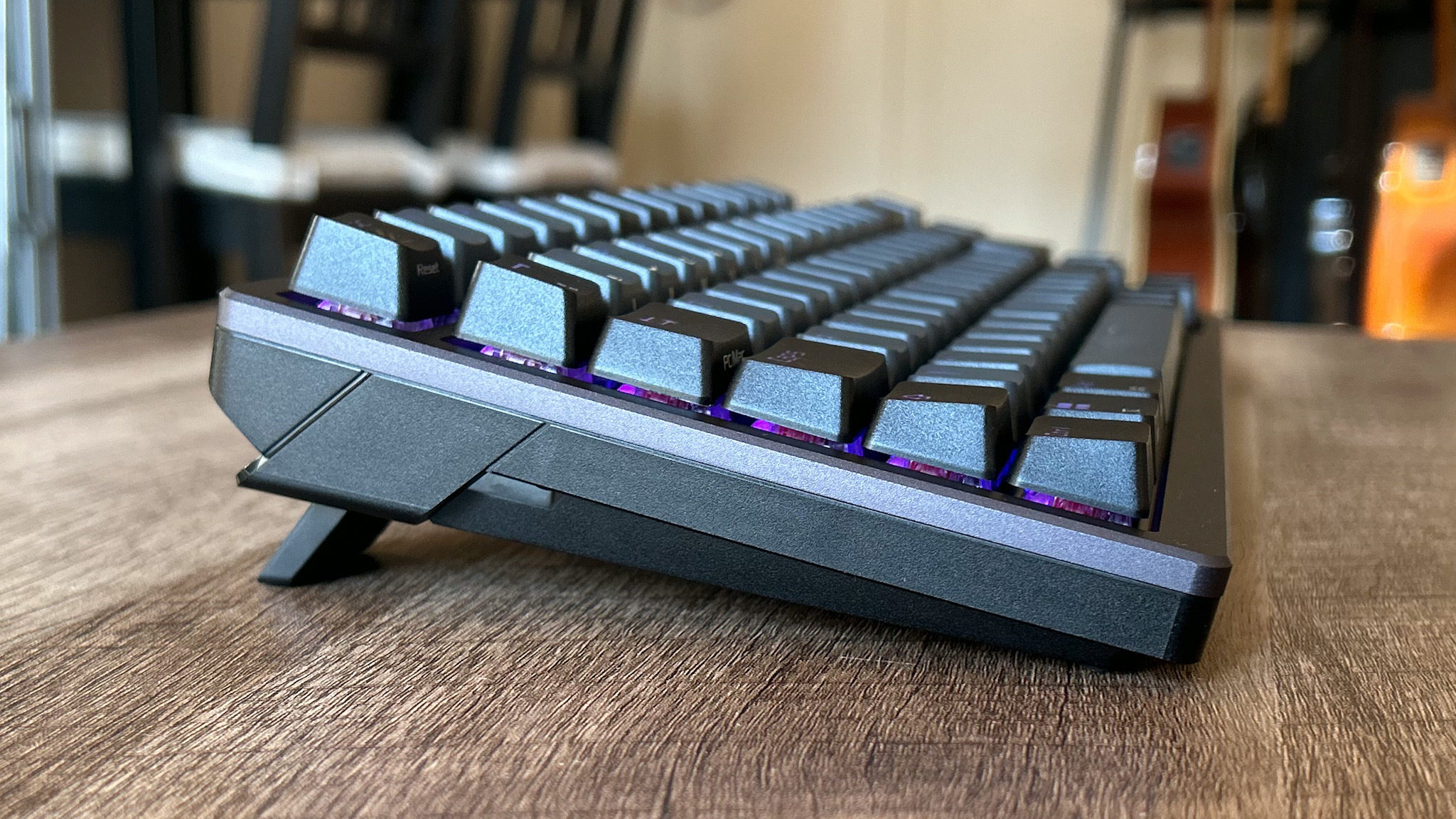
The actual keyboard layout feels perfectly balanced as well. A smaller frame usually means making sacrifices in functionality to allow for more mouse-swinging space, but here the Azoth manages to keep a miniature footprint while also offering a row of navigation keys and arrow buttons. 75% keyboards usually offer this layout, but in a block of keys that adds to the overall length, so by keeping things skinny here we're getting the best of both worlds.
The aluminium frame running along the top of the deck gives way to a plastic underbelly - a design that will separate the Asus ROG Azoth from the enthusiast keyboards it takes inspiration from. However, the plastic material underneath allows this wireless gaming keyboard to offer both 2.4GHz and Bluetooth without getting in the way and still carries a high build quality without having any auditory effect on the sound of each keypress.
Features
You aren't sacrificing anything from the standard feature list to pick up that excellent enthusiast design here. All the standard anti-ghosting and n-key rollover features are still present and accounted for, unlike many typist-first devices. The full deck is also programmable with on-the-fly macro recording and six profiles to set up as well. That's far more than you'd usually see in a hot-swappable keyboard of this quality, but for the cash, we wouldn't expect anything less.
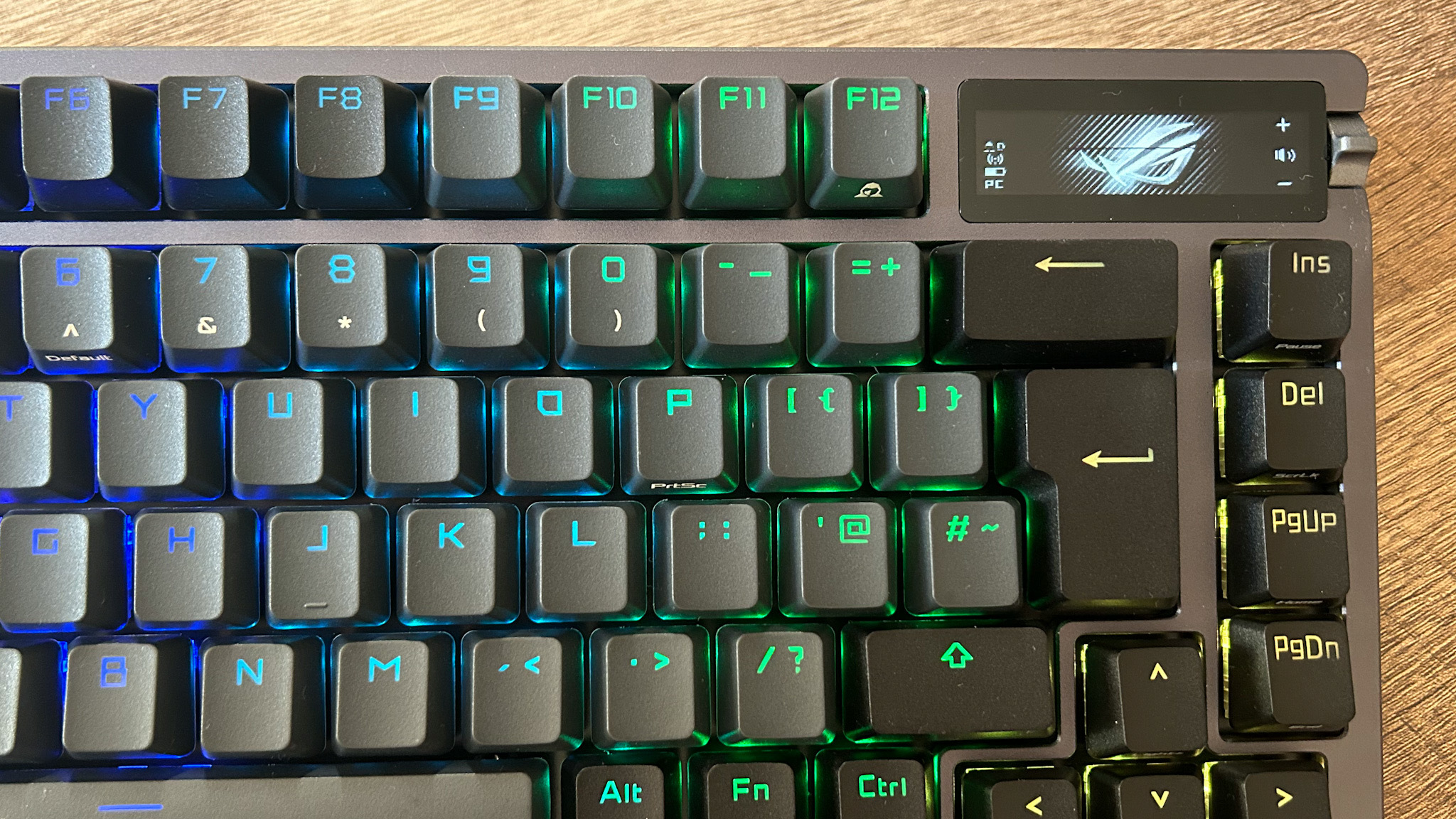
Where the Asus ROG Azoth shines, though, is by tying all those standard features together with some additional quality-of-life enhancements that add that extra premium feel. The first, and most noticeable, is the OLED display sitting in the top right corner. This is a surprisingly high-quality display, with plenty of detail in the rolling animations and plenty of space for system information.
Next to this display, you'll find a small control knob that can be set to control volume, playback, keyboard brightness, OLED display brightness, or switch the LED lighting effect on your keyboard. You can also set your own custom commands through the Armoury Crate software on top. It would have been nice to control both media playback and volume without having to switch presets, but there's a surprising amount of flexibility in this one small knob.
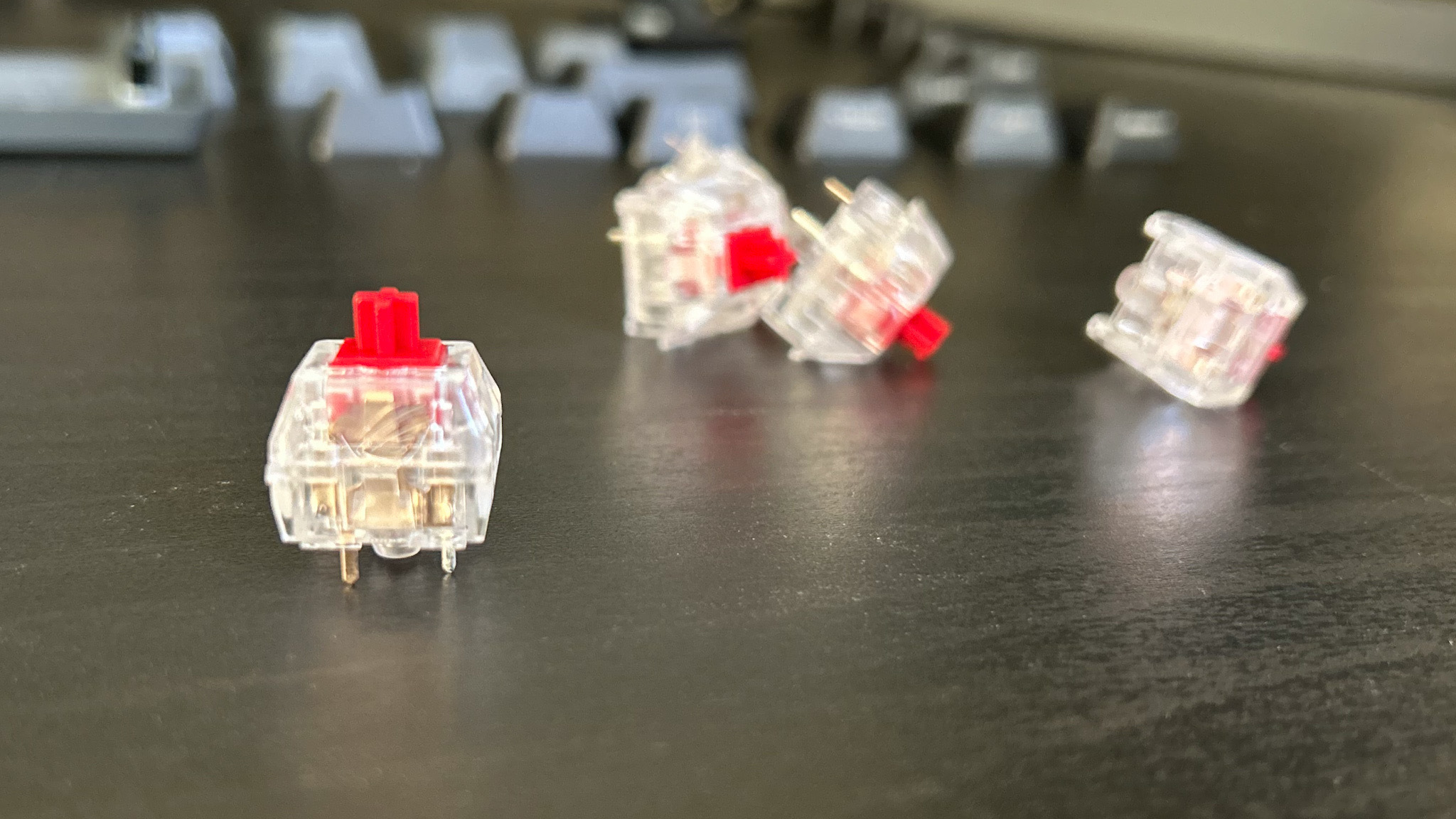
Of course, all this extra pizazz would get us nowhere without a solid set of keys to type on - and this is the Azoth's not-so-secret weapon. Asus has used its own NX switches under the hood, a 1.8mm actuating red linear number with 40 gram-force (gf) of actuation force and a slick, nippy debounce. Combine that with the aforementioned gasket mount design and luxury keycaps and you've got a stunning typing experience. All of that comes with pre-lubed stabilizers and its own lubing kit including Krytox GPL-205-GD0.
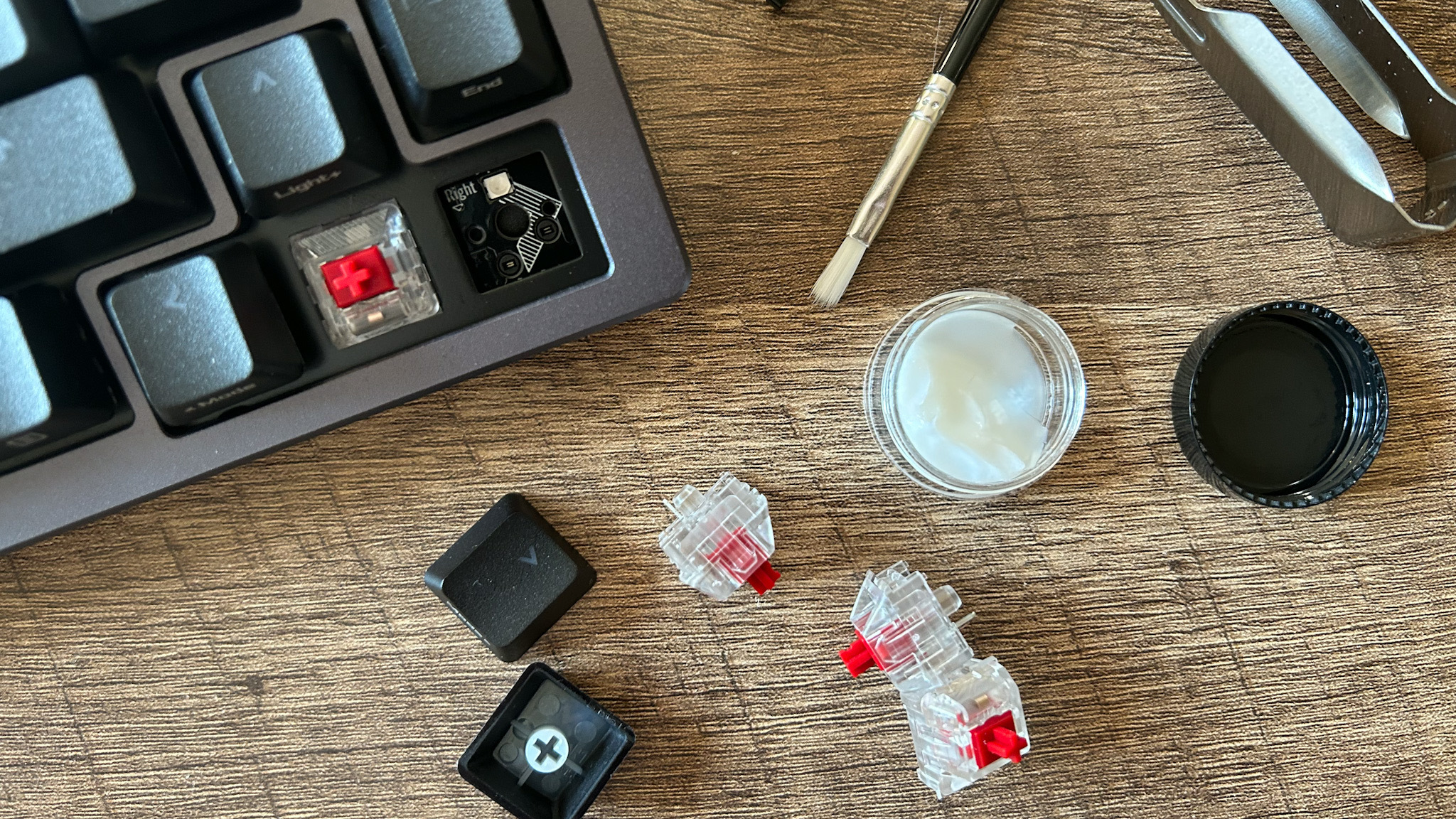
Performance
I'll come out and say it: I've had my hands on a lot of enthusiast, custom, and gaming keyboards and this is the best typing experience I've ever had. An off-the-shelf deck has never offered such a high-quality feel, and to do so with all the gaming features of a specialized rig is a marvel. Each switch clacks with a subtle but still satisfying clack, and bounces back with incredible speed, but on top of that, you've got the gasket mount feel and sturdy build quality to set the ROG Azoth apart from the rest of the market.
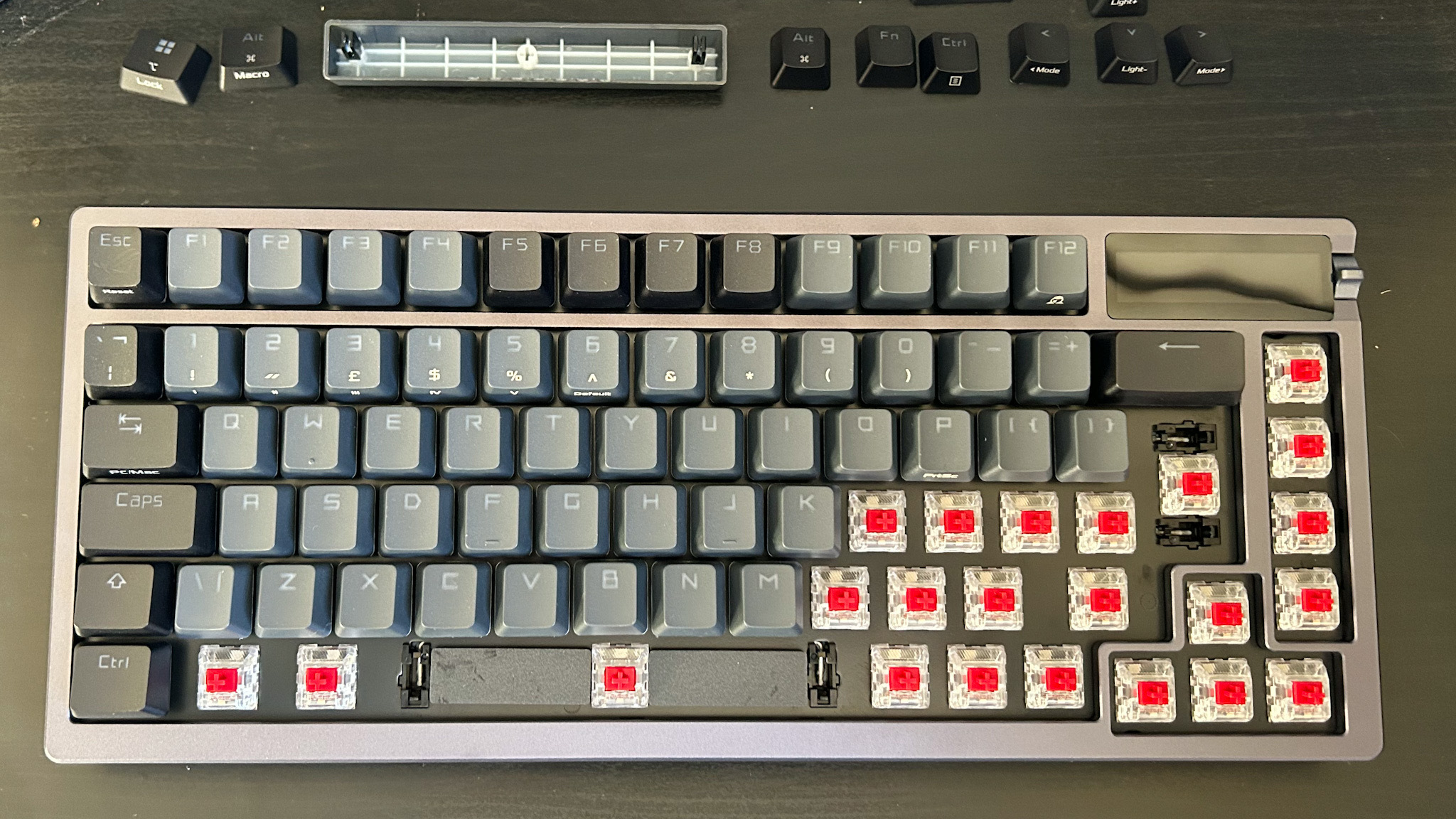
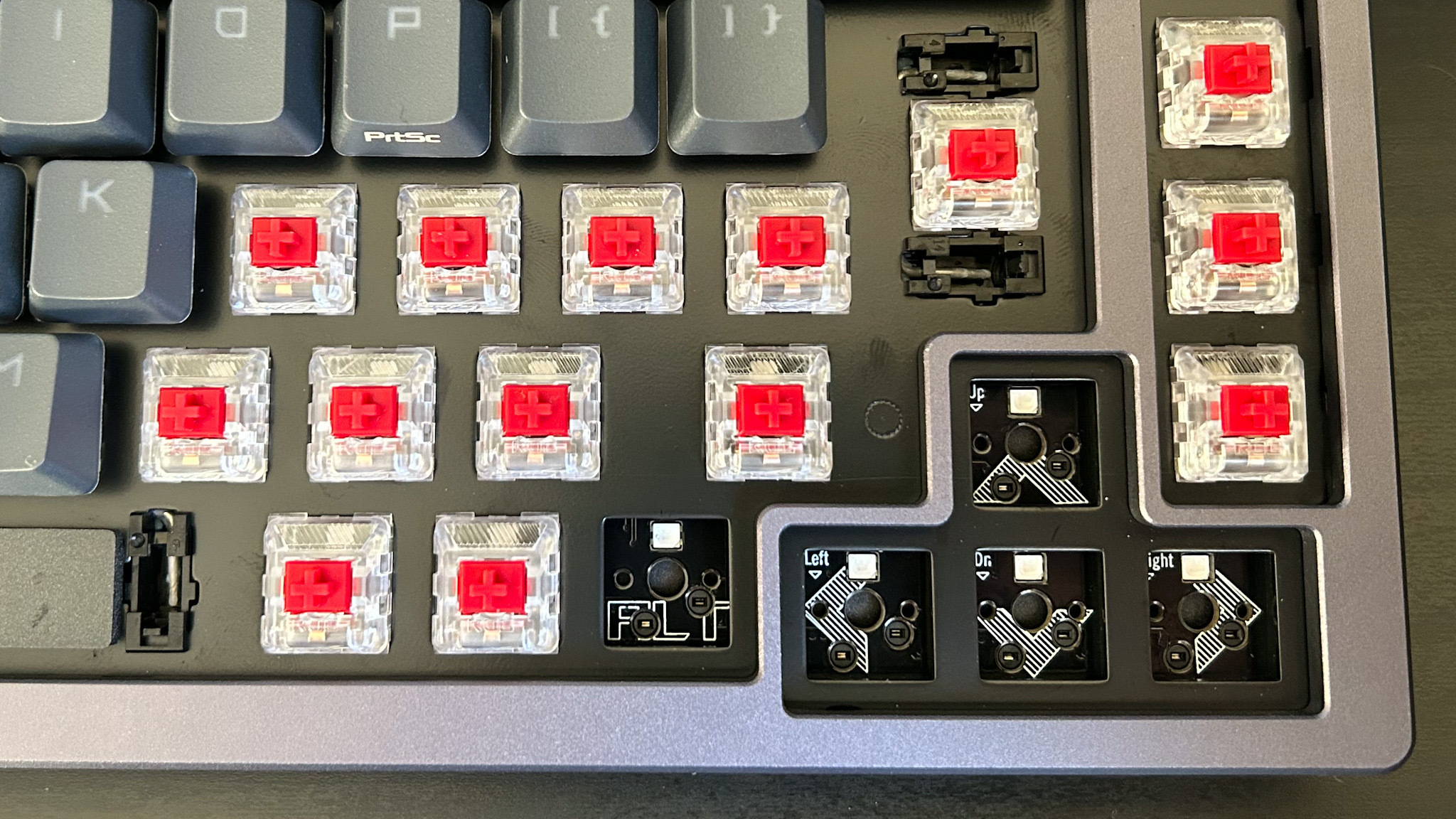
Swapping switches is easy and simple, and I never found any clickers awkwardly jammed or requiring excessive force to remove as can sometimes be the case. I took a brief departure from the stock NX switches to add some standard Cherry MX Reds, which still managed to shine in the chassis.
I often find that hot-swappable models lack the internals to keep up with truly frantic gaming action. I've never not been able to play on decks like the Mountain Everest Max or Keychron Q2, but the speed of a dedicated machine simply hasn't been there. The Asus ROG Azoth, by comparison, is seriously nippy. It might not offer tournament-level responses, but you'll still feel a marked improvement in everyday fps and action titles.
Pair that with a faultless wireless connection and long-lasting battery life (I ran this deck for a week straight and only had to recharge once), and it's clear this is an all-round winner.
Should you buy the Asus ROG Azoth?
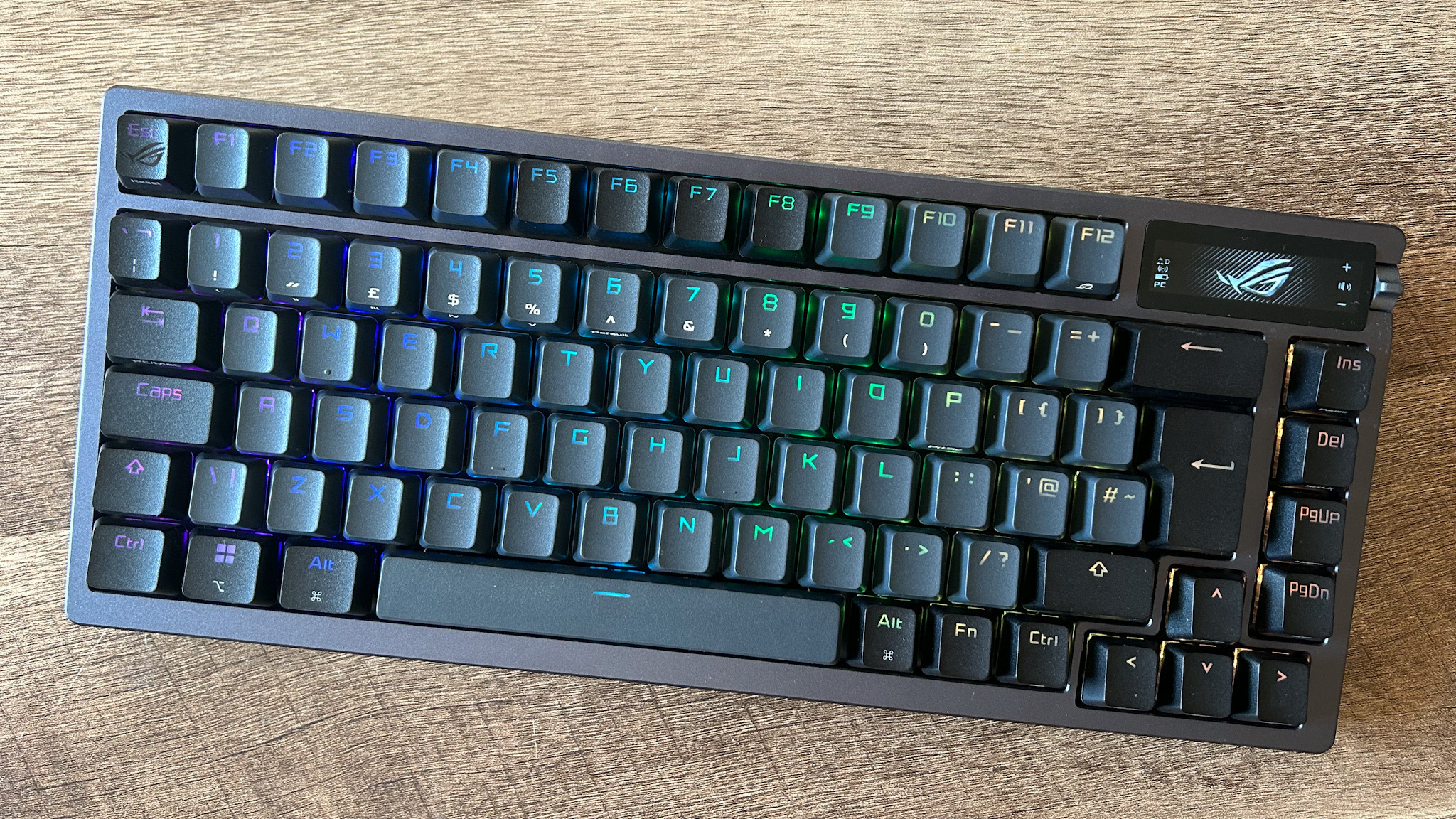
If you're looking to invest in a high-end gaming keyboard, the Asus ROG Azoth should absolutely be at the top of your list. There aren't too many keyboards knocking on this $250 / £250 door, but competition is out there.
For the same kind of money, you can pick up the Razer Huntsman V2 Analog, a full-sized wired deck with adjustable actuating switches but no hot-swappability. Or, if you don't want to lose that customizable edge, you could also look at the cheaper Corsair K70 Pro Mini. Available in a wireless model, and offering a strong typing experience, you're just not getting the same level of high-end quality. You're spending around $100 / £100 less on Corsair's model, and that will suit those looking to tinker with their switches and still play. However, the Azoth is of a far higher quality, with that gasket mount design and super smooth feel all around.
In short, it's certainly not a cheap gaming keyboard but this is the best deck I've had my hands on in a long time. It's going to take a lot to knock the Asus ROG Azoth off my desk, and I would seriously urge anyone looking for a premium typing experience to keep one on theirs.
How we tested the Asus ROG Azoth
I used the Asus ROG Azoth over a period of two weeks, using the deck for all daily work and play. During that time, I primarily tested across Apex Legends, Rise of the Tomb Raider, and Epistory while also comparing against both the Mountain Everest Max and Corsair K70 Pro Mini. I also completed a full switch swap, installing a set of Cherry MX Reds and then returning to the Asus NX switch.
You can find out more about how we test gaming keyboards in the full GamesRadar+ Hardware Policy.
We're also rounding up all the best Razer keyboards on the market if you're sticking with the gaming giant. Or, take a look at the best Asus gaming laptops available if you're completing a set. We're also rounding up the best gaming mouse models to pair your Azoth with as well.

Managing Editor of Hardware at GamesRadar+, I originally landed in hardware at our sister site TechRadar before moving over to GamesRadar. In between, I've written for Tom’s Guide, Wireframe, The Indie Game Website and That Video Game Blog, covering everything from the PS5 launch to the Apple Pencil. Now, i'm focused on Nintendo Switch, gaming laptops (and the keyboards, headsets and mice that come with them), PS5, and trying to find the perfect projector.

